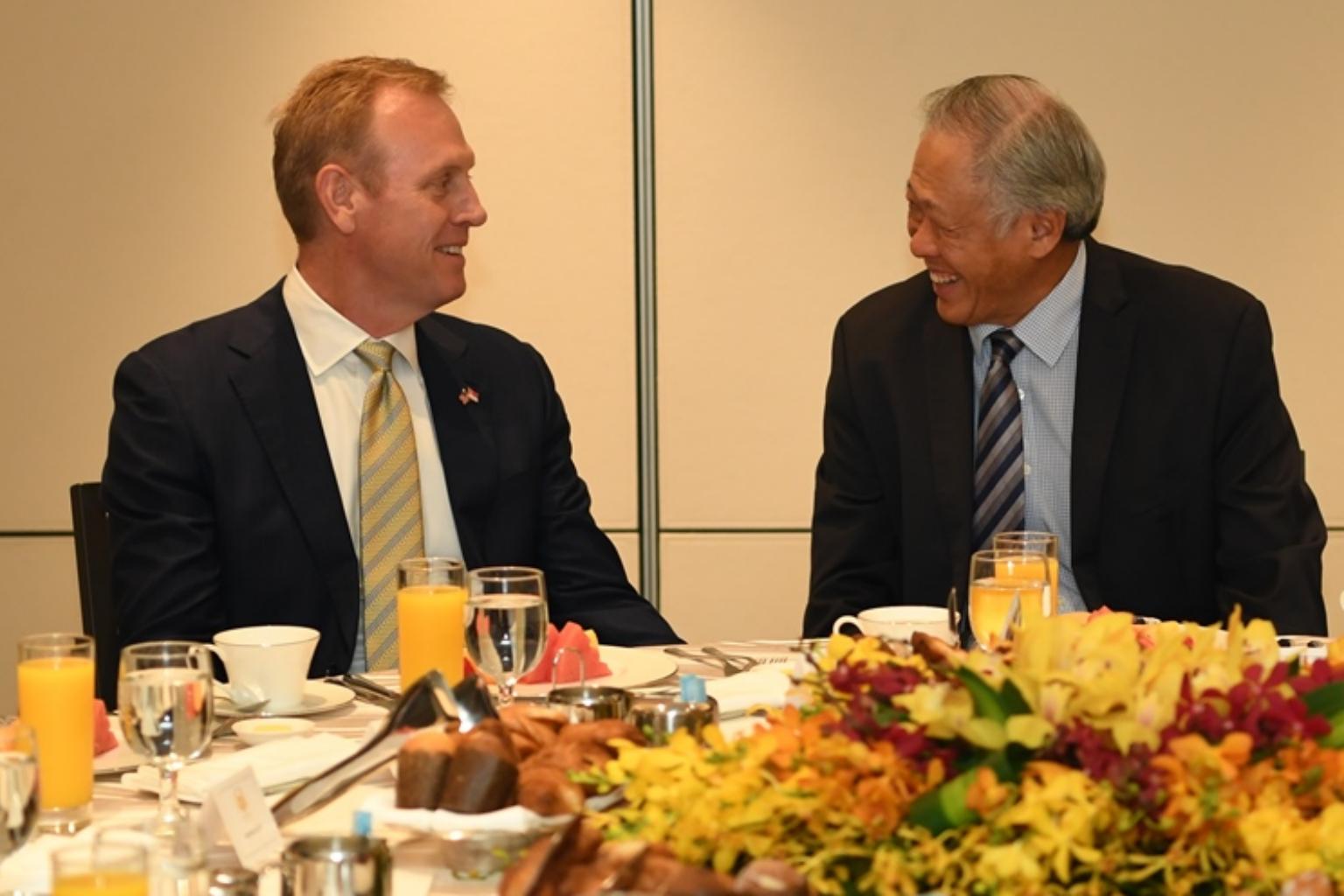Singapore and US to update and renew key defence pact
Sign up now: Get ST's newsletters delivered to your inbox

Singapore's Defence Minister Ng Eng Hen (right) and US Acting Defence Secretary Patrick Shanahan welcomed the imminent renewal of a 1990 Memorandum of Understanding for the United States Use of Facilities in Singapore.
PHOTO: MINDEF
Follow topic:
SINGAPORE - Singapore and the United States have agreed to update and renew a key pact which provides for the US security forces to use Singapore's air and naval bases, and has underpinned the US regional presence for almost 30 years.
In a breakfast meeting on Friday (May 31), Singapore's Defence Minister Ng Eng Hen and US Acting Defence Secretary Patrick Shanahan welcomed the imminent renewal of the 1990 Memorandum of Understanding (MOU) for the United States Use of Facilities in Singapore, as they reaffirmed the excellent and longstanding bilateral defence relations.
The two ministers also affirmed the need for stable defence ties between the US and China amid increasing trade tensions, and for countries in the region to work together for the security and prosperity of the region, said a media statement from the Ministry of Defence.
The landmark MOU, signed in 1990 by founding prime minister Lee Kuan Yew and then US Vice-President Dan Quayle, is to be renewed by 2020.
Under this pact, the US has rotationally deployed fighter aircraft for exercises, refuelling and maintenance, as well as Littoral Combat Ships and P-8 Poseidon aircraft to Singapore.
The renewed pact will incorporate partnership elements of the US National Defence Strategy recently articulated for this region.
Mr Shanahan also called on Prime Minister Lee Hsien Loong at the Istana later on Friday, ahead of the annual Shangri-La Dialogue which kicks off in the evening with a keynote speech by Mr Lee.
At Mr Shanahan's meeting with Dr Ng, both sides discussed key bilateral initiatives, including more training detachments for the Republic of Singapore Air Force in a suitable US military base.
Mr Shanahan highlighted the US' intent to remain committed in the region, and to work closely with Asean.
Both sides also exchanged views on a wide range of geopolitical developments and regional security issues, including countering the regional terrorism threat.
Mr Shanahan is in Singapore with a delegation of senior US officials, including Secretary of Navy Richard Spencer and Commander of the US Indo-Pacific Command Admiral Philip Davidson. Members of the US Congress - both the House of Representatives and the Senate - are also attending the dialogue.
Mr Shanahan arrived in Singapore on Thursday after a stopover in Jakarta, during which he called on Indonesian President Joko Widodo. It was the first leg of his Asia tour that will also take him to South Korea and Japan.
MAJOR SPEECH ON INDO-PACIFIC
In his major policy speech at the dialogue on Saturday, Mr Shanahan is expected to reaffirm continuity in US commitment to Asia, even as the increased tensions in the Middle East claim its attention.
He will also dwell on the Trump administration's vision for the Indo-Pacific, which his predecessor James Mattis also spoke on at last year's dialogue.
He may raise concerns about China's militarisation of contested territory in the South China Sea and stress US support for Taiwan, including the sale of advanced weaponry, which Beijing regards as interference in its sovereign affairs.
As the dialogue is attended by regional defence ministers and military officials, Mr Shanahan may use the opportunity to set out areas in which the US and China can expand cooperation, even as they clash on trade, technology and world views. This may help assuage concerns about miscalculations and accidental encounters between their militaries in the South China Sea setting off wider conflicts between the two superpowers.
Similarly, China's Belt and Road Initiative, under which it is seeking to invest close to US$1 trillion (S$1.38 trillion) in infrastructure projects across Asia and Europe, may come in for criticism. The US has declined to participate in the Chinese initiative which it bills as "debt-trap diplomacy" through which China builds strategic influence.
Under Mr Trump, the US has restored the military budget cuts enforced by the Obama administration and is pressing ahead with military modernisation programmes after identifying China and Russia as top strategic threats.

En route to Singapore, Mr Shanahan had said he expected to be able to isolate the bilateral military talks from the tensions that are roiling the trade relations between the two largest economies in the world.
In his address on Sunday, General Wei Fenghe, the first Chinese defence minister to address the forum in a decade, may choose to include a rebuttal of the US strategy as he speaks on the topic of China and international security cooperation.

